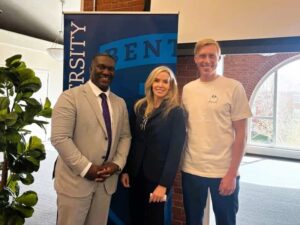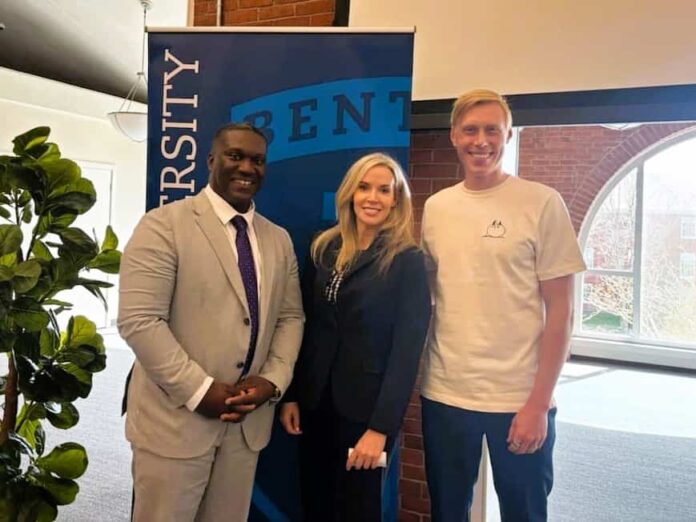The future of HR isn’t about adopting AI for its own sake—instead, thoughtful integration requires a wide lens that considers all stakeholders.
This was the topic of conversation at Bentley University near Boston, as the 2025 Global AI Summit brought together HR, healthcare and tech professionals for a timely conversation about artificial intelligence in the workplace. Afternoon content was co-hosted by HR Executive and the Future Talent Council, featuring a panel that bridged the worlds of HR and healthcare—two industries deeply rooted in human connection—now navigating rapid transformation.
Panelists leading the afternoon included Madeline Laurano, analyst and founder of Aptitude Research; Joey Price, author and CEO of Jumpstart HR; and Tobias Porserud, general manager at Mentimeter North America. Together, they explored AI’s role in shaping the future of cross-disciplinary work, from ethics and engagement to talent development and vendor relationships.
Rethinking attention, wellbeing in the age of AI
One of the most resonant themes was the challenge of short attention spans in the modern workplace. Porserud observed that it takes about 20 minutes for people to reach deep focus, yet most work environments often don’t allow for that, particularly as the ecosystem of enterprise platforms grows, pulling the thoughts of employees in multiple directions. “How do we build a tech stack around the shorter attention span?” posited Porserud.

Price emphasized that shorter attention spans are already reshaping how HR designs learning and onboarding experiences. All panelists agreed that the solution lies in intentional design—creating systems that support active participation rather than passive multitasking.
Burnout and wellbeing also emerged as major concerns. AI holds the potential to alleviate some of the pressure on workers, but the panel warned against rapid implementation without preparation.
“AI can be a great tool for many if we can present it in a way that’s useful,” said Porserud. HR leaders must navigate this pace with care, asking not just what can be automated, but what should be.
Trust and the human side of AI in HR
Ethics were a throughline in nearly every part of the discussion. Price reminded the audience to build and buy tools that put humans first. “AI is in the eye of the beholder,” he said, reminding the audience that individual perception and problem-solving needs will impact the value of new technology.
From algorithmic bias to safety governance, the panel agreed that leaders must build fairness and transparency into every layer of deployment. “We’re at a point where tools like agent co-pilots can either enhance or erode trust,” he said. It all comes down to “how thoughtfully” organizations introduce them.
The future of talent
Another thread centered around AI’s influence on talent. With AI becoming a basic part of many roles, the responsibilities of positions may be shifting, particularly for entry-level jobs, according to the panel. Candidates—especially those in early careers or career transitions—need to ramp up faster and come equipped with a baseline understanding of AI tools.
The panel agreed that there is an upside for young, early-career workers. Porserud said that AI-native generations will be able to solve problems in “new and fresh” ways that previous generations may miss. For HR, this means rethinking onboarding, skills development and internal mobility in multigenerational workforces.
Read more: How to make tech at work a driver of intergenerational collaboration
Solid vendor partnerships
The panel also delved into how HR tech vendors and buyers can work together more effectively. Porserud urged fellow vendor representatives to speak plainly and understand the real challenges clients face. “It’s not a checkbox game,” he said.
Laurano added advice for those HR leaders shopping for new tech solutions. She said that RFPs often miss what matters: a vendor’s leadership values, flexibility and passion for solving real problems. Transparency, hands-on access and aligned expectations are critical ingredients for successful partnerships. Laurano added that she’s been impressed with the level of customer advisory action at many of today’s HR tech providers.
AI-ready workforces
Interestingly, parallels between HR and healthcare surfaced throughout the discussion. Both sectors rely on empathy, deal with high-stakes decisions and now face the complex task of integrating AI without losing their human core. Price reflected on his early experience in sports healthcare, saying, “The goal is turning the person you have into the person they want to be. That’s just as true in HR.”
The panel closed with a reminder that AI strategy isn’t one-size-fits-all. It’s not about flashy solutions—it’s about focus, foresight and intentionality. “AI transcends any industry,” said Porserud. “But there are so many problems to solve. The real challenge for HR is deciding what matters most.”
The next HR Tech Meetup is June 30, 2025, in San Diego. The next Future Talent Council Global AI Summit event is June 17-18, 2025, in Stockholm. Register at the links here.



